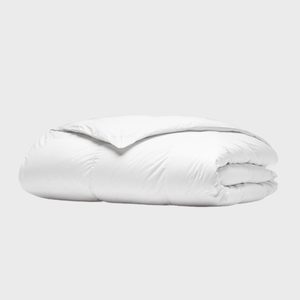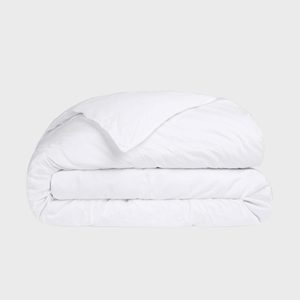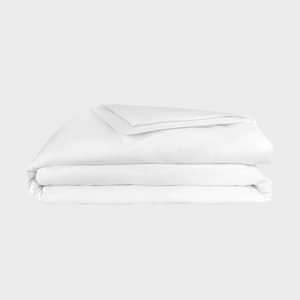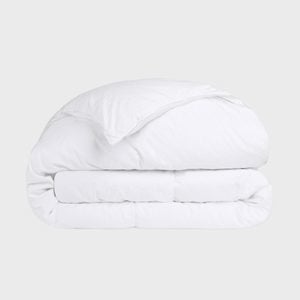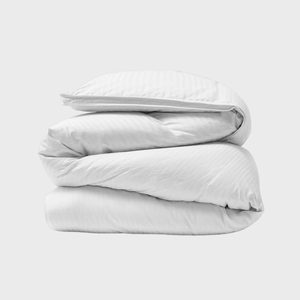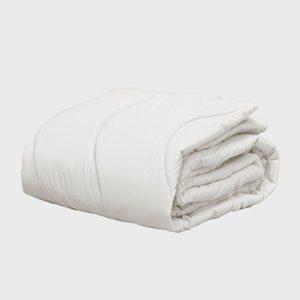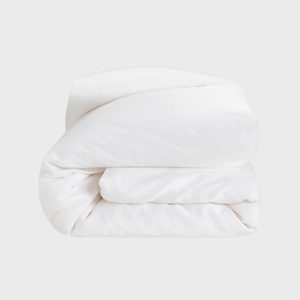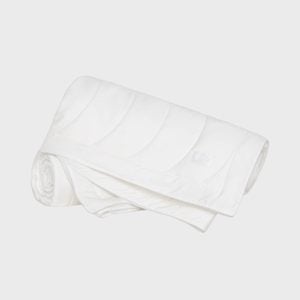Duvet vs. Comforter: How to Choose the Best Blanket for Your Bed
Updated: Feb. 05, 2024
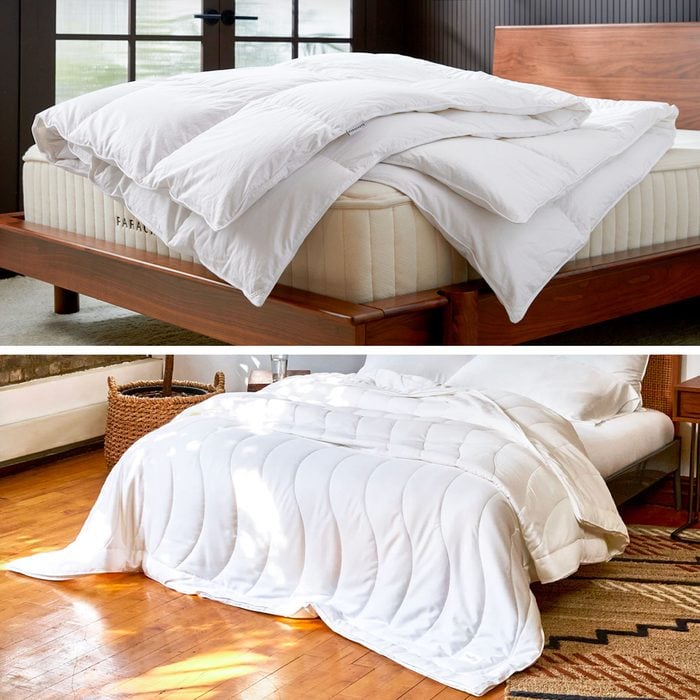
From price, to care, to style, the best duvet or comforter for your bed is the one that suits your sleeping habits.
Our editors and experts handpick every product we feature. We may earn a commission from your purchases.
After a long day, all you want to do is tuck yourself into bed at night. Relaxing in cozy sheets is a good start, but snuggling under a soft blanket sets the mood for a peaceful, deep slumber. If you’re looking for a bed topper for a good night’s sleep, you’re probably choosing between a duvet and a comforter.
When I owned a duvet many years ago, going to bed felt like being wrapped in a warm hug. But I also remember constantly trying to keep the duvet insert inside the duvet cover with some unruly buttons. Fast forward to today, and I sleep soundly under my comforter and favorite bedding. It’s not as plush as my duvet, but it’s certainly less work.
Duvets and comforters sometimes get used interchangeably, but is one better than the other? Although they might seem the same, knowing the difference between the two can change how you sleep. With the duvet vs. comforter argument, here’s what you should consider when choosing between the them.
What’s the difference between a duvet and a comforter?
Duvets and comforters are similar in look, but they have different purposes. You use a duvet with a cover, and a comforter is a singular piece you use all by itself. Both are thick with an inside fill, but a comforter has a more evenly distributed fill since it’s a single piece. This difference provides more all-around coziness while you sleep. On the other hand, a duvet has a removable, washable and replaceable cover. Duvets are easier to clean and swap out for a change in your seasonal aesthetic.
All about duvets
First, what is a duvet? A duvet is a blanket with two pieces: an insert and a cover. Insulated down, cotton, feathers or synthetic fibers fill the insert. A cotton, silk or linen duvet cover securely encases the duvet with ties, loops or buttons. Think of a duvet insert and its cover like a pillow and pillowcase. If you like the ability to switch up your bedding frequently, then a duvet—or a bed quilt—is a good option.
Unlike a comforter, duvets are covers with inserts tucked inside, so they are less polished and require two separate purchases. Buying both a duvet insert and a duvet cover adds up. However, the two pieces allow for more versatility with decor. Mix and match bedding according to your mood or the season simply by switching out your duvet cover without replacing the insert.
Like the best cooling blankets, the best duvets are breathable. Lightweight cotton and linen fabrics keep you cool during warmer months. Boll & Branch duvet inserts offer three different weights ideal for regulating temperature. Hot sleepers can pick a lightweight insert while colder sleepers can go with something heavier.
Additionally, duvets should have a good fill distribution. A lumpy distribution is a downside of a duvet since the insert and cover are sold separately. The right insert that’s properly constructed won’t have this issue. A duvet with baffle box construction, like this one from Parachute, has even distribution to maintain its shape. Its duvet inserts are also made of hypoallergenic down-alternative or cruelty-free down fill.
Pros
- Easy to refresh the look
- Separate, washable covers
- Fluffier look
Cons
- Inserts and covers sold separately
- Some inserts don’t stay inside their covers
All about comforters
So, what is a comforter? A comforter is a fluffy, thick, quilted blanket without an insert or cover. It’s a standalone piece of bedding filled with down material or synthetic fibers. Comforters are typically the final piece in a bedding set. You place them on top of bed sheets to pull a look together. Because of this convenience, comforters don’t involve much shopping around, but you can choose between two main types: a down comforter or a down alternative.
Duck or goose feathers provide the filling in a down comforter. These lightweight comforters keep you warm year round and are very plush. If you like feeling like you’re sleeping on a big, white cloud, then you’re probably more suited to a down comforter. In contrast, cotton and synthetic down-alternative comforters are hypoallergenic, easier to maintain and less expensive.
Something else to consider in the duvet vs. comforter debate is the ability to protect your bed topper from sweat and body oils. A removable duvet cover acts as a protective, washable layer. But you can also use a top sheet as a barrier between you and your comforter and stay cool since comforters are usually more lightweight. Consider a Saatva comforter that’s moisture wicking with temperature-regulating lyocell fill fabric and organic cotton shell.
Even though comforters might flatten over time, they tend to be slightly more affordable than duvets, as they’re included in a bed set of sheets and pillowcases. This added ready-to-use convenience goes a long way, especially if you don’t enjoy making your bed daily. Since they’re one piece with fixed insulation, comforters might be too warm for optimal sleep, so we recommend adding a breathable bamboo cooling blanket to your bed set to offset this in the warmer months.
Pros
- Standalone piece
- Available as part of a bedding set
- Larger in size
Cons
- Harder to clean or keep clean
- Require a brand new comforter to change the look
FAQ
Which is better comforter or duvet?
Deciding between a duvet vs. comforter is a personal choice. If you prefer having the option to switch out a cover, then a duvet is the better pick. But if you rather have something that’s part of a bedding bundle with fewer components, then a comforter is the way to go.
Do I need a duvet if I have a comforter?
You don’t need a duvet if you already have a comforter. A comforter provides the same layering and warmth as a duvet. If you’re looking for something easier to wash and switch out, consider adding a duvet and using it under a comforter. Or place a comforter inside of a duvet cover to change the look without purchasing an additional duvet insert.
The bottom line
When deciding between a duvet vs. comforter, knowing the similarities can make all the difference when choosing a bed topper that’ll help you attain your best sleep. A fluffier duvet might be the right choice for you if that allows you to relax and sleep deeper. If assembling the duvet insert and cover isn’t a hassle and you like the option of changing your bed topper throughout the year, then a duvet might be your pick. For something that easily matches your existing bedding, opt for a comforter that you can layer over your sheet set without worrying about covers, loops and fluff. Both duvets and comforters are similarly priced and offer quality materials, depending on where you shop.
Where to buy the best duvets
Find a duvet at any company that sells home essentials like bedding and sheets. Our top picks provide a mix of high quality and comfort, made with premium materials at affordable prices. Buy the best duvets at retailers like Parachute and Boll & Branch.
Where to buy the best comforters
Similarly to duvets, you can buy the best comforters from brands that sell high-quality bedding and mattresses. Find the best comforters from top retailers like Cozy Earth, Saatva and Buffy.

